The Saints’ Lost Season: How Sean Payton and New Orleans Survived 2012

This story appears in the Jan. 14, 2019, issue of Sports Illustrated. For more great storytelling and in-depth analysis, subscribe to the magazine—and get up to 94% off the cover price. Click here for more.
Even now, the boys of Liberty Christian can walk you through the finer points of 28 Gator Halfback Pass. They were sixth-graders back in the fall of 2012, running around a turf field in late-afternoon practices, ironing out a few wrinkles under the darkening north-Texas sky. And this particular trick play was the brainchild of their new offensive coordinator, who’d drawn up Gator for his 11-year-old son, Connor, an offensive linemen with skill-position aspirations. Here, Connor slid over from center to tight end and Adam Johnson subbed in for Andre Washington at tailback, because he had a better arm.
Liberty Christian ran a ton of sweeps that season, and this one began like any other toss: The defense always swarmed to the ball. But here, by the time Adam stopped in the backfield to cock his arm, Connor was gliding in the distance, wide-open. Best anyone can remember, the Warriors ran Gator on at least three occasions that year, an 8–2 season that ended with a loss in the league championship game—and the ball never hit the ground on any of them.
Hard as it is to believe, many of the boys from that team insist today they had no idea why Coach Payton was there in Argyle, in the north Dallas suburbs, eight hours away from his job as the coach of the New Orleans Saints, teaching a watered-down NFL playbook to a bunch of middle-school kids.
Sean Payton was fun to be around. If your parents forgot to swing by in the afternoon and shuttle you from home to the practice field, Payton was the one who’d convince the other coaches to spare you the daunting late-for-practice sprints. But he also maintained the aura of a guy three years removed from winning Super Bowl XLIV. Ask the coach if a certain play was the same one he’d drawn up for Drew Brees and Marques Colston, and he’d flash a wry smile. “I don’t know,” he’d say. “Maybe it is. Maybe it’s not.”
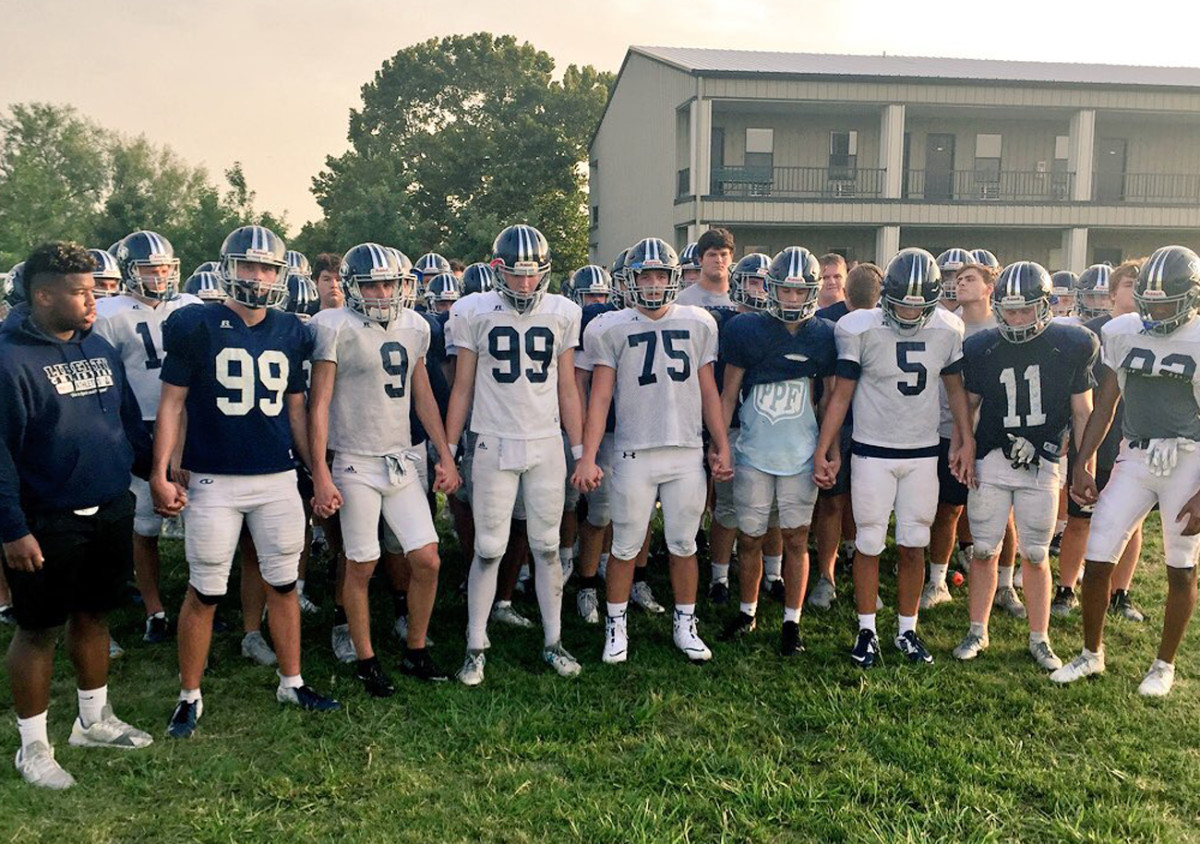
Through time, the emotional weight of that fall has started to settle in for everyone in Argyle and in New Orleans, even if it’s still a period the Saints’ organization prefers not to revisit. Those sixth-grade boys are high school seniors now, and they recently played their last game at Liberty Christian (a private pre-K-through-12 school with four tackle football teams), just as New Orleans barreled into this year’s NFL postseason looking like the best team in football. Payton was on hand in November for Liberty’s playoff victory against Plano Prestonwood, and he doled out bear hugs at their awards banquet a few weeks later.
The coach, meanwhile, seems further removed than ever from the shadows of the scandal that came to be called Bountygate. He’d been barred from the NFL in 2012 after a league investigation determined that the Saints had orchestrated a “pay for performance” program over the course of three years, encouraging undue violence and rewarding players for injuring opposing stars. He remains the only head coach ever banned for a full 16-game season—a sentence he has publicly warred against, as recently as a broadcast interview in October. (General manager Mickey Loomis was also banned for eight games and defensive coordinator Gregg Williams for a year. Four players were suspended, though they later had their punishments overturned.)
The story of Sean Payton and the kids of Liberty Christian isn’t necessarily one of redemption. Years later, one former Saint sums up that old team this way: Some of those players and coaches were among the most upstanding in the NFL. And “some were bad guys.”
Instead, that 2012 season demonstrates how football can heal, even after it delivers a swift punch to the kidney. Without their coach and his galvanizing voice, the Saints’ leaders—including a few crucial holdovers on this year’s No. 1 NFC seed—had to weather chaos on their own. And without the Saints, Payton got to recalibrate himself emotionally and physically, according to those who know him. He took what he loved about football and distilled it down to its purest form.
“I needed them more than they needed me,” Payton told the Denton Record-Chronicle in November. (He declined to be interviewed for this story.) “I found it to be very fulfilling. . . . To have a season to work not only with your son but also his peers was special.”
It’s five days before Christmas 2018, and a handful of Saints players are hanging around their locker room’s main artery, two Gatorade refrigerators flanking a stack of four television screens—two by two—that today are projecting a rousing game of Super Smash Bros.
Defensive end Cam Jordan, a 2017 All-Pro, sits on the edge of an overstuffed black beanbag chair, balancing two boxes of personal pizza on one thigh and a video game controller between his hands. The theme song from Zelda plays over a cacophony of cheers and grunts as he pilots his character, Star Fox, to an easy victory over a few Saints teammates.
The Ping-Pong table used to be this team’s communal gathering place, until this Nintendo fighting game gained popularity two years ago—now tournaments pop up every Wednesday and Saturday. Nongamers, meanwhile, crowd around a six-foot basketball hoop and joke about cash bets as they chuck an underinflated ball at the rim.
It is rare in this space to see anyone lingering alone. Various interpositional cliques exist simultaneously and harmoniously, like gears in an open-faced watch. Yes, this sense of community is a hallmark of winning teams, but, as some players learn over time, it’s also an absolute baseline necessity for survival in the NFL.
“We do little tournaments,” says Jordan. “You’d like to think [it keeps the guys together], all the trash talk, all the camaraderie you build. Team bonding.”
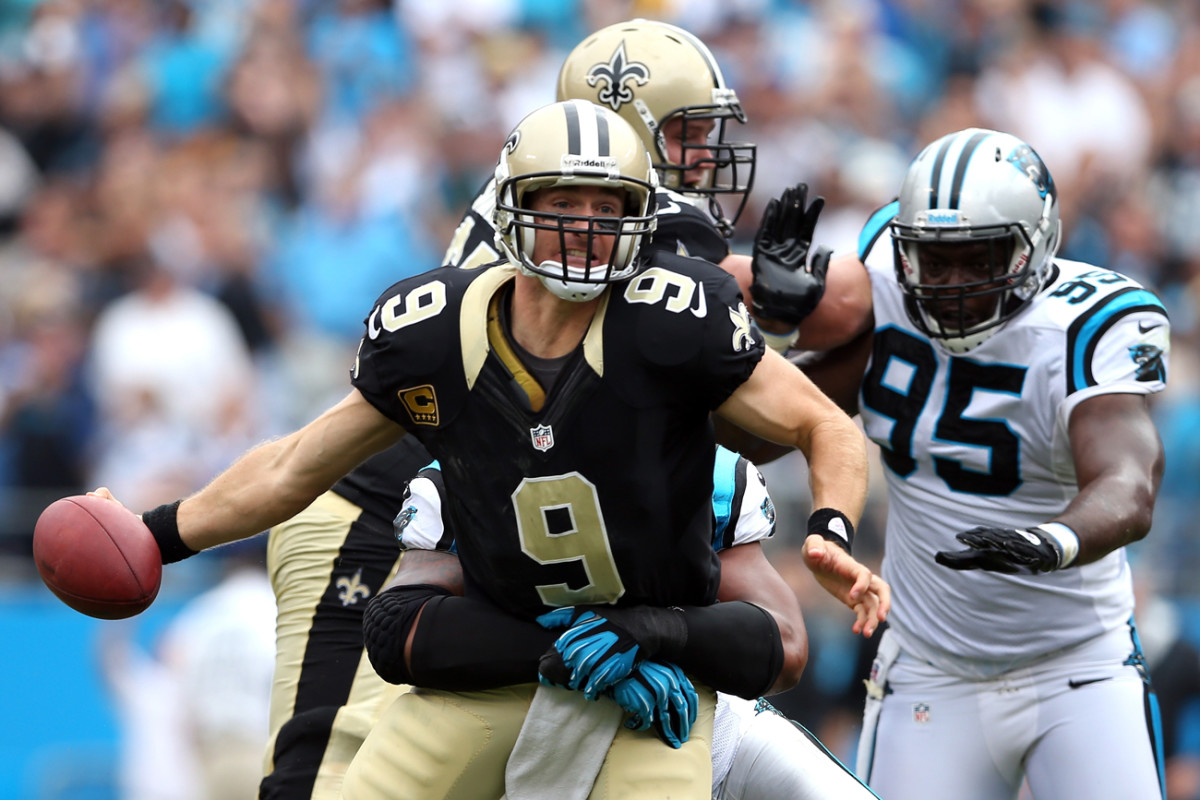
Jordan was just 23 and in his second season in the NFL in 2012, a young kid whose goofy West Coast disposition got him labeled “space cadet” by older players. Mark Ingram, who scored six rushing touchdowns this season, was also 23 and in his second year. Some of those older teammates, now retired, remember how quickly their professional lives were robbed of normalcy in a campaign marred by scandal and ineptitude (including an NFL-record 7,042 yards yielded by the defense). Ingram says he fell back on Colston, receiver Lance Moore and linebacker Jonathan Vilma, each of whom was at least 29. For Jordan it was defensive linemen Sedrick Ellis and the late Will Smith—and then, a year or two later, it was Jordan’s turn to mentor the newcomers. If nothing else, he says, “you’ve got to be able to provide stability for your guys.”
Says Vilma: Those guys “did grow up very quickly. Cam and Mark had been on that historic run the year before”—the 2011 Saints set records for passing yards and yards from scrimmage—“then they realized how quickly everything can turn on its head. It was humbling for them to see how fast the NFL moves.”
“I saw some of the best leaders I’ve ever been around check out,” says safety Malcolm Jenkins, who played five seasons for the Saints before joining the Eagles, “because it was ridiculous. Our assistant head coach [Joe Vitt] was suspended for six weeks. We had a new D-coordinator in [Steve] Spagnuolo. His scheme didn’t fit our personnel at all, so we were the worst defense in NFL history. We tried to hold it together . . . but there was a point in the season where it’s just, like, everybody for themselves.”
Six years later, with the Saints throttling opponents, smashing records and locking up home field advantage in the playoffs, it’s been easier fostering team chemistry. Through both seasons, though, there has been a recognition of something growing organically that needed attention—an awareness that isn’t always present in NFL locker rooms. And it’s these small moments (video game tournaments, inside jokes, offensive line dinners where the running backs drop by) that can keep a team grounded in some seasons, and afloat in others.
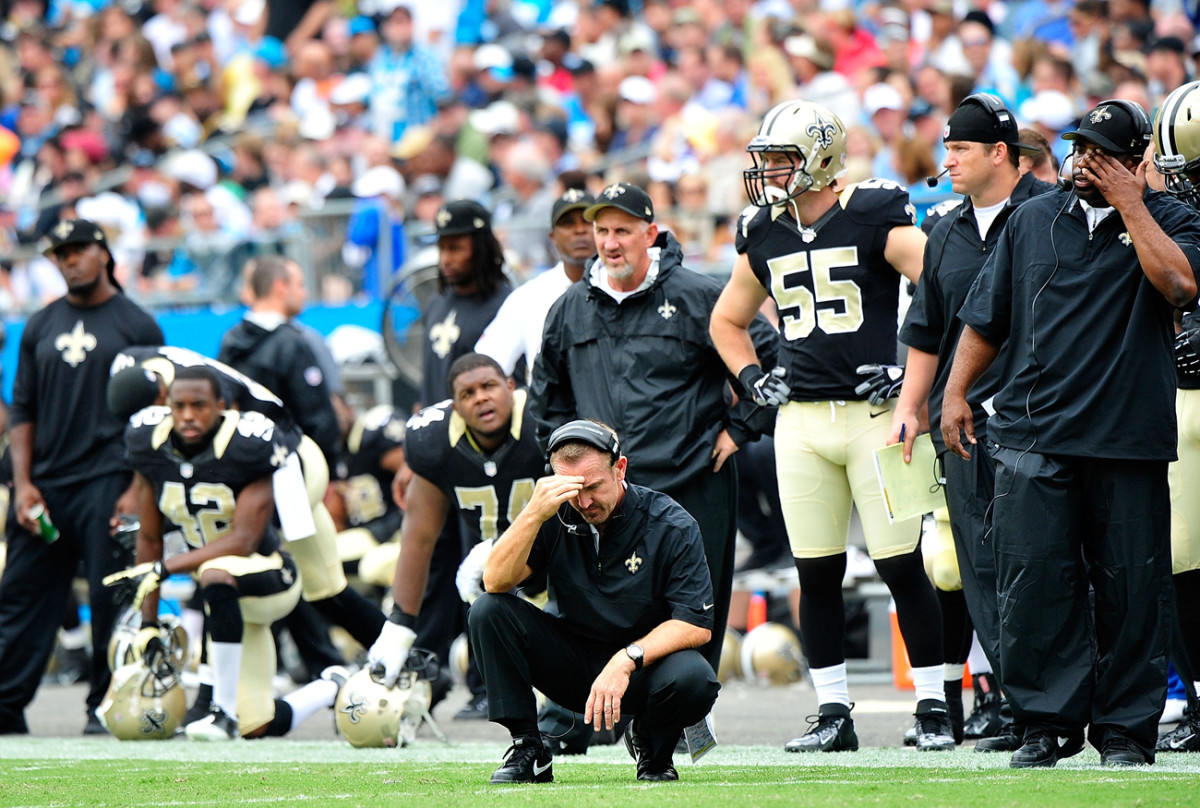
For many players on that post-Bountygate team, that meant reminiscing about past successes (tight end David Thomas, for one, talked to the team about his time in New England, and how the Patriots weathered Spygate) and, in the moment, embracing a macabre sense of humor. Defensive players, in particular, connected much in the way that grade-schoolers might bond over the quirks of a substitute teacher. Safety Roman Harper recalls Spagnuolo’s complimenting guys in meetings for doing things on the field that were counterintuitive to the directions they’d previously been given—and players cracking up about it.
“It was so funny,” says Harper. “Me and Vilma would be sitting there, and whatever Spags would say, we’d be like, ‘Yeah, O.K., coach. We got it. Whatever.’ Then we’d go out and do whatever we wanted on the field. . . . [People didn’t understand] how much fun we had during down times. We weren’t going to let the suspensions get in the way.”
Others took a more philosophical approach. The Saints had a long-standing Saturday night meeting they called “players’ table,” and here everyone could digest the uncertainty and work through the emotions of enduring an NFL scandal that branded players indiscriminately. “We were painted as criminals,” says now-retired fullback Jed Collins. “What pissed me off was this idea of being stereotyped again. As athletes, we’re already put in a bucket and told who we are.”
And then there was the common bond of attachment to the guy who was missing—who, despite pouring his heart into a youth football team 500 miles away, still had New Orleans on his mind. Payton achieved omnipresence throughout the Saints’ Metairie facility, even beyond the massive banner, unfurled at the practice facility, with his face and the slogan DO YOUR JOB. In a way he was keeping tabs, longing to be in an NFL locker room again.
It was October 2012—Andre Washington remembers this detail because Liberty Christian’s sixth-grade team was wearing pink socks for Breast Cancer Awareness Month. The Warriors’ starting halfback had dislocated his hip, and now coach Payton was turning to Washington, an offensive lineman at the time, asking if he’d like to be the new workhorse.
“I was like, ‘Yes, sir!’ ” says Washington. “From right tackle to running back—that was the start of it all.”
It was a job he’d never give back. Late in that 2012 season at Liberty Christian, Payton gave Washington his first real indication that the boy could have a future in football, telling his new back, “You know who you remind me of? Mark Ingram. If you stay in the weight room, you’re going to be something special.”
Six years later Washington racked up 32 TDs and almost 3,000 all-purpose yards this season, earning first-team all‑state honors in Texas and scholarship offers from the likes of Missouri State.
Payton’s ties to Liberty Christian have strengthened even further over the years as he’s become an influential presence in the class of 2018’s football journey. When the high school team changed coaches last winter, he called up the newly hired Steven Greek to congratulate him on landing the gig, and they ended up staying on the phone for more than an hour. At one point, Greek says, Payton even volunteered to fill the water bottles during seven-on-seven drills.
Greek has since used Payton as a resource, leaning on him for help in evaluating players and personnel, and drawing from the experience of coaching Drew Brees. Greek, who took the 2018 team to the state semifinals, sums it all up: You dial up Sean and “shut up.”
In November, in advance of the Warriors’ second-round playoff game, Greek texted Payton a picture of that old sixth-grade crew, along with a video “thank you” message. “Man, I know you couldn’t be with us,” he wrote, “but I want you to know that you’re as much a part of this journey as any of us. If it weren’t for you and your investment in the lives of these young men, I don’t know if we’d be here.”
Payton, on the day his Saints thrashed the Falcons 31–17 to reach 10–1, replied, “That was one of the greatest text messages I’ve ever gotten.”
It’s difficult to comprehend the emotional elasticity Payton must have felt during his suspension. Here, on one hand, is the doting offensive coordinator who would let sixth-grade kids goof around after stretching, before sending them off, delirious and excited, into the Oklahoma Drill. The guy who discovered CrossFit and, as two former Saints joke, started styling his hair differently during his time away—all indications that he might have viewed his ban as life’s way of telling him to take it easy, no matter how unfair it all felt.
Here, too, is the guy who still held a great affinity for the players and the team he left behind. During one sanctioned trip through the locker room that season—a game the league office permitted him to attend, escorted—Payton was “crying, all emotional,” says Harper. Staying away was painful.
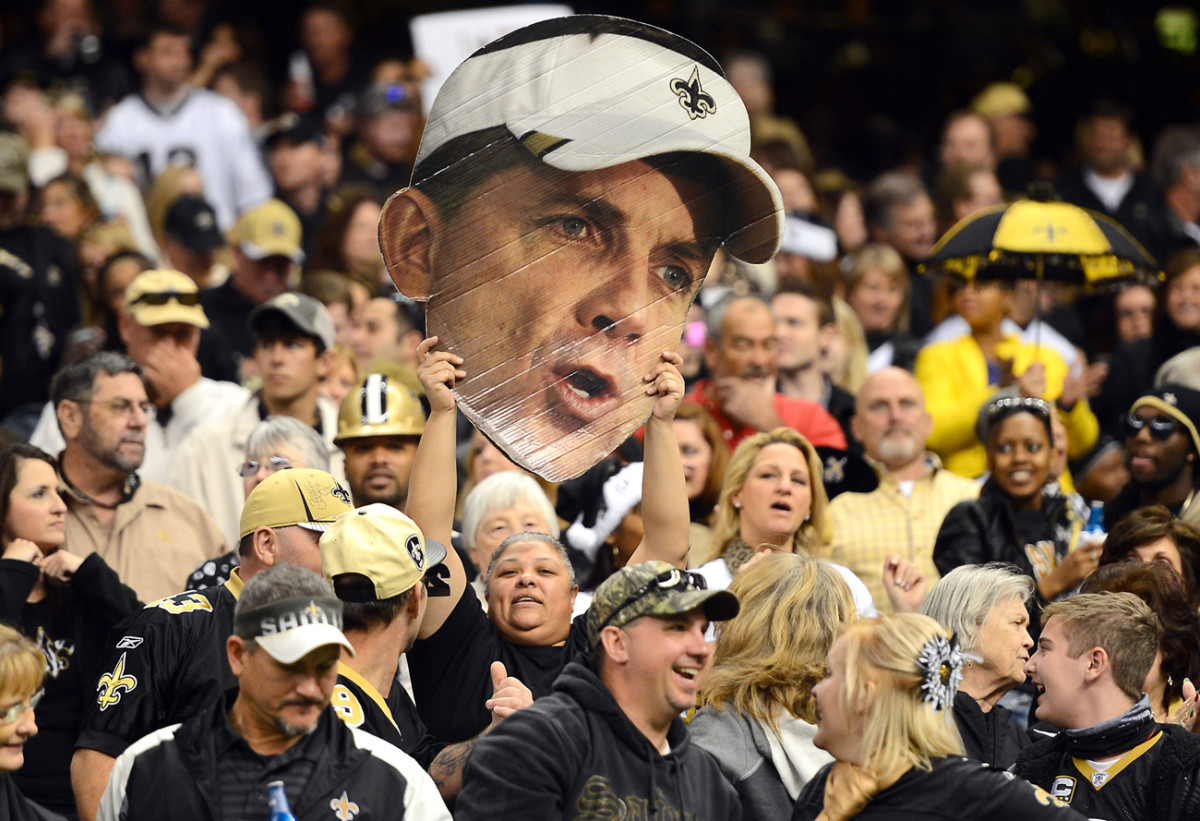
Maybe it’s possible to have a transformative experience and still resent the rock you stumbled on. There was no mistaking it from players who watched Payton give a rollicking comeback speech upon his reinstatement, in 2013: He was different. Energized and in great shape. Focused.
And the Liberty Christian boys agreed—the time they’d spent with Coach Payton was something they wouldn’t forget. He was present and passionate. Many of them maintain their love of the game.
“When I hear someone that’s coaching in the pros say that I play like one of them, it means a great deal to me,” says Washington. “It meant so much that I really just held on to it.”
The Saints had each other during Bountygate. And the boys of Liberty Christian had Payton. But whom did Payton lean on? He turned to a man who, in times of chaos, has an uncanny ability to slice through the extraneous, who speaks in chiseled aphorisms about toughness, seizing opportunity and making your own luck—a human self-help book for the kind of hardened person who tends not to lose battles with circumstance.
Bill Parcells, now 77 and deliberate as ever, laughs when asked about that year. He remembers Payton, his QBs coach in Dallas from 2003 through ’05, calling to offer him the Saints’ interim job when the scope of his suspension became clear. (Parcells declined, though he says he would have accepted the position if everyone in the building had been on board.) He also recounts with love the time Payton called up asking for advice about a game plan. The Liberty Christian sixth-graders were about to play a team that ran the single wing. Here is a guy whose professional life had been turned upside down, and he’s trying to figure out a way to shut down a bunch of kids using the Pop Warner playbook. Parcells laughs: “We had a good time talking about that.”
The old coach appreciates that about Payton. Always has. Less wallowing, more action. One of Parcells’s favorite sayings comes from his late father, Charles: “If you’re up to your ass in alligators, it’s no time to be talking about draining the swamp. You gotta get out of there first.”
Parcells long ago made this point to Payton, as he did to all of his assistants: This is what the job is all about. There are five things that go wrong every day of your life in the NFL—five things, varying in severity, from personnel issues to injuries, that will negatively effect your day. And if you can’t deal with that, you should probably find another job.
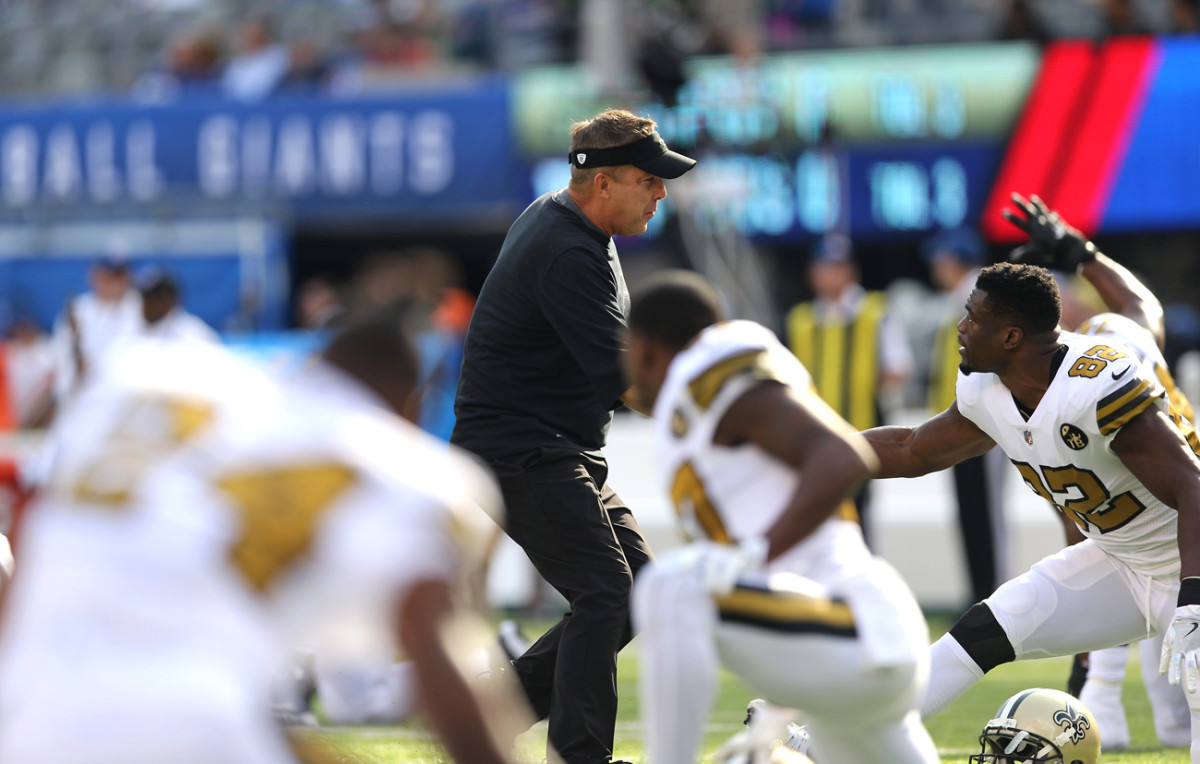
Maybe coming up this way, operating in this game, for both Payton and the Saints he left behind, made the unfathomable weight of the situation seem normal. You find a way to laugh. You take comfort in the machinations football lays out in front of you. Maybe that’s what makes the joy Payton seemingly derived (and created) from a simple halfback pass so poetic. It’s a play that allows the opposition to think they have you dead to rights, marooned in the backfield, only to realize a wide-open receiver has emerged, waving for the ball.
“We all go to dark places in this life,” says Parcells. “Something happens—it can be financial, physical, the death of a loved one—and it puts us in a dark place. And the answer to that is always the same. It’s what you do next that counts.
“It really is true. We all experience some disconcerting things, and I’m sure that was one of these for Sean. But nobody cares. You have to pull yourself up.”
Question or comment? Email us at talkback@themmqb.com.
